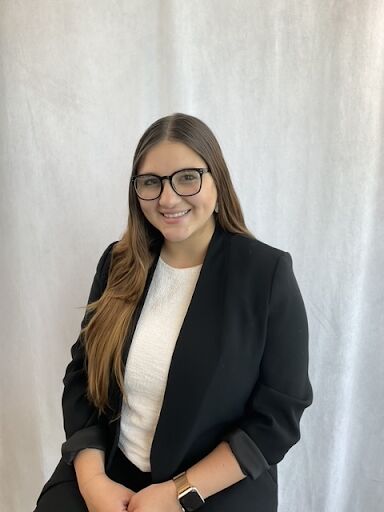Local change agent selected as Truman Scholar

Image courtesy of Chelsea Davis.
Natalia V. Rios Martinez is the first Hispanic woman to be selected as a Truman Scholar at Iowa State.
April 26, 2022
Out of 705 applicants, only 58 Truman Scholars were selected, and Iowa State senior Natalia V. Rios Martinez beat those 8 percent odds.
On April 11, Rios was selected as a Truman Scholar, the first Hispanic woman at Iowa State to receive the Truman award.
“I received the notification that I was selected as the Truman Scholar, and I cried again,” Rios said. “And I was just very happy.”
According to Rios, a Truman Scholar is a change agent– someone with lots of community service and leadership experiences.
Rios is a senior studying political science, international studies and public relations. Her triple major takes up nearly half the width of her resume header, but that’s not the only eye-stopper.
Rios is the founder and president of the Political Science Club, was headquarter intern in the community relations service at the US Department of Justice, civil rights intern for the Iowa Department of Transportation in the Civil Rights Bureau for two years, Student Government Senator and an intern at the House of Representatives of Puerto Rico for a summer, to name a few.
While Rios’ resume is a testament to her success, but it doesn’t quite capture how passionate and inspired she is about public service.
Rios takes inspiration from the resiliency of Puerto Ricans, who have made it through hurricanes, earthquakes and corrupt governments. Being from Puerto Rico, Rios took inspiration from her home country and applied it to the required policy proposal of the application.
The application has three parts: campus nomination, where a certain amount of students are nominated from each college, national application, where the student fills out a 12-page application and panel interviews.
The application required intense prep work with revisions to essays, mock interviews and perfecting her proposal.
Rios’ policy proposal was to restructure Puerto Rico’s health care system so that prescription medicine was more accessible with less interference from insurance companies.
“So your doctor prescribes you X medicine, whatever medicine, and then at the end of the day, it has to go back to your insurance, and they decide if they’re going to cover it for you,” Rios said. “It’s not a doctor deciding what medicine you get.”
According to Rios, if the insurance company can find cheaper medicine that comes close to meeting the doctor’s prognosis, the company will choose that medicine, even if it means more side effects.
“So it’s not a medical decision,” Rios said. “It’s a for-profit decision.”
Rios used this knowledge when constructing her policy proposal.
“So my policy proposal proposed to remove that intermediary [so] patients would get immediate, full coverage for the medicine that they need,” Rios said. “And the insurance company doesn’t have a say in what medicine you get.”
Not only is Rios passionate about this policy, she recognizes there are intersectional impacts that will come as well.
Rios is also an undergraduate researcher with the department of sociology at Iowa State, where she’s been researching access to lawyers in rural communities.
“And through that research, I learned there are a lot of places in the United States where people don’t have access to lawyers, and what that means is that people are incarcerated at larger rates,” Rios said. “People don’t know their rights, and sometimes their rights are being violated, and they don’t even know.”
Preventative health care could have prevented many of these crimes, but the health care system works reactively, not proactively, “because it’s a for-profit system,” Rios said.
“And if you look at our jails or the justice system, they don’t really rehabilitate the people that are in jail,” Rios said. “They just put them in jail for years.”
Therefore, according to Rios, her policy proposal wouldn’t just improve access to medicine, it could also decrease crime and incarceration rates.
“It inspires me when people heal other people and then you see those little changes turn into something big,” Rios said.
The Truman Scholar award has validated Rios’ passions and career choice to be a public servant. Rios hopes to take a gap year to work in a federal government pathway program. She then plans to attend graduate school at Georgetown University to study American government.
In the future, Rios hopes to attend law school and become a public defender before representing Puerto Rico in Congress.
The next step for Rios as a Truman Scholar is to travel to Missouri for leadership week, where she’ll learn what it means to be a Truman.
Students with questions regarding the Truman Scholar program or application process can contact Rios.






